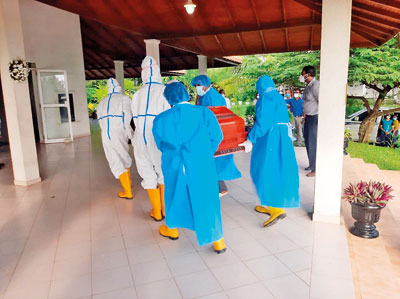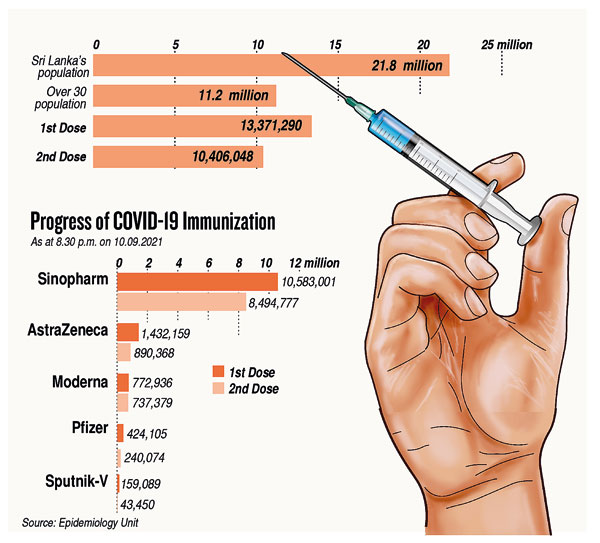News
For whom the bell tolls: Experts warn of high death rate in spite of vaccination ‘success’ stories
The extended lockdown, even though not as stringent as it should be, is showing a small positive impact on the overwhelmed hospital system but the death data are giving a bleak picture of the so-called “success” of the vaccination programme, warned many experts.
The lockdown which was on till Monday (September 13), has now been extended till September 21.
Looking at the “most” vulnerable group in this COVID-19 pandemic who are the elderly and those younger but with dangerous co-morbidities, a vocal expert said this group has still not been fully covered, though announcements are being made about the “success” of the vaccination programme.
Many experts turned to the Epidemiology Unit data themselves to prove their point. The cumulative numbers up to September 3 were:
- The fully-vaccinated number (with both doses of a vaccine) – 9,007,588 (just over 9 million)
- The partially-vaccinated number (with one dose of a vaccine) – 3,652,643 (nearly 3.7 million)
- Total deaths since the pandemic began – 9,806
- The deaths among those unvaccinated – 7,816
- The deaths among those who had got one dose of the vaccination – 1,555
- The deaths among those who had got both doses – 435
- The deaths among the over-60s – 7,529
- The deaths in the 50-59 age group – 1,344
- The deaths in the 30-49 age group – 824
- A calculation of the deaths in the over 50 group amounted to 8,873, which was nudging close to the total death toll from COVID-19 which was 9,806

Final journey of a COVID victim as loved ones look on from a distance
The data from the most recent week (the Epidemiology Unit report for the period August 28-September 3, 2021) also indicate that 90.7% of deaths reported during the most recent week were in those over 50 years old and that 87.2% of those who died had either not received a vaccine or received only one dose of a vaccine.
Experts ask if this is evidence of a “successful” vaccination programme?
“The success of such a programme must be judged on the outcomes and we will not have successful outcomes unless the vaccination is targeted in an evidence-based manner,” said one.
This expert added: “If there is a fire, it is not helpful to spray water in all directions – the water has to be directed at the fire.”
With the emergence of new variants like Delta, vaccines cannot be used to stop transmission, said another, reiterating that they have to be deployed to reduce severe disease and death – that means to those who are older and those with co-morbidities. “Therefore, the percentage of people vaccinated is not the measure we should be looking at – it is the percentage of those in high-risk categories fully vaccinated. So far, such data are unavailable.” 
If a majority of the elderly have been vaccinated, especially in the Western Province (Colombo, Gampaha and Kalutara districts), who is occupying the Intensive Care Unit beds and who is on oxygen, another queried.
This has led to many experts questioning whether sufficient efforts are being made to target the high-risk groups, to understand why vaccine uptake in them is not high.
Some of the highly pertinent queries from these experts are:
- Are there opportunities for the elderly to have priority in vaccination or do they have to stand in queues with hundreds of others who are not at risk?
- Are the vaccines being targeted to those with hypertension or diabetes through state hospital clinics, where these patients are being followed up?
- Can we do more to take the vaccines to the high-risk groups in a more proactive way?
Many were also critical of the Pfizer vaccine being sent to Hambantota for the vaccination of those between 20 and 30 years, calling it an “irrational” move.
These comments came as two medical specialists Dr. Ananda Wijewickrama and Dr. Asoka Gunaratne resigned from the Intercollegiate Committee which had been set up a long time ago at the very beginning of the pandemic, to advise the Director-General of Health Services on crucial matters including vaccination.
Dr. Wijewickrama has been very vocal about the need to follow the original priority list for vaccination which put the elderly at the very top after the healthcare workers.
Numerous medical professionals including the Sri Lanka Medical Association (SLMA) Expert Committee even last week reiterated that the “first priority” should be to vaccinate all persons over 60 years of age and those between 18-60 with co-morbidities as early as possible, while giving a 3rd dose with Pfizer, AstraZeneca or Moderna (Spikevax) to ‘specific’ categories.
“These recommendations are made with the objective of reducing to a minimum, the number of deaths due to COVID-19,” the SLMA said, while giving the categories of those who should be administered the 3rd dose as:
- Those over 60 years of age who have received two doses of the Sinopharm vaccine. The 3rd dose should be administered at least 28 days after the 2nd dose.
- Those over 12 years of age who are immune-suppressed and had been administered two doses of any vaccine. The 3rd dose should be given at least 28 days after the 2nd dose. Those between 12 and 18 years in this category, should be given Pfizer or Moderna.
| Vaccination in progress All vaccination centres in Colombo, Gampaha, Kalutara and Galle will vaccinate those between 20 to 29 years, according to the Presidential Secretariat vaccination dashboard. While in many areas, it was the Sinopharm vaccine that was being administered to this age group, Hambantota is using the Pfizer vaccine. Breakdown of vaccines administered as of Thursday;
| |

